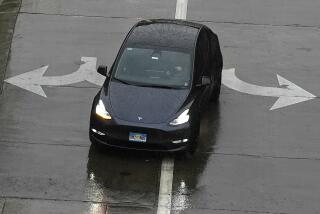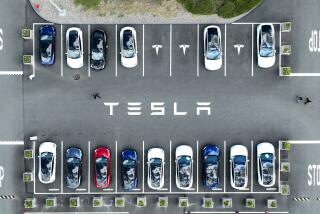Vehicle Buyers Intensify Shift to Smaller Models
Soaring gasoline prices boosted sales of smaller, more fuel-efficient cars and trucks in April as motorists’ appetites for big pickups and sport utility vehicles continued to shrink.
Overall, sales of new cars and trucks were down 3.7% from a year earlier, according to industry data released Tuesday. As has become the norm, the decline was led by sinking sales for Detroit’s automakers.
Sales of foreign makes rose, with Japanese juggernaut Toyota Motor Corp. recording a 4.5% gain from a year earlier.
But April was gloomy for Detroit as sales slid 10.8% at General Motors Corp. and 6.7% at Ford Motor Co. Chrysler Group, the U.S. arm of Germany’s DaimlerChrysler, ended a three-month string of gains with an 8% decline.
With the White House cautioning drivers this week to expect high gasoline prices for the next several years, analysts viewed the April sales data as confirming a nationwide trend away from the larger trucks that have dominated the market and helped keep the American automakers afloat.
“It’s not so much the current prices as the perception that things aren’t going to get better in the future,” said analyst James Hossack of AutoPacific Inc., a research firm based in Tustin.
“In the past, people discounted gas prices because they went up and down,” he said. “But with the global situation now, they don’t see that anything is going to change.”
Motorists seeking relief at the pumps are quickly turning to smaller “crossover” SUVs such as the Toyota RAV4 and Chevrolet HHR, making the latter a bright spot for GM as the new model added almost 10,000 units to its April sales volume.
A new crop of subcompact cars exemplified by Toyota’s Yaris and Honda Motor Co.’s Fit, both introduced in recent weeks, also is attracting buyers.
Nissan Motor Co. will launch the Versa subcompact in July, and Ford and GM are thought to be rushing their own subcompacts into development -- but it could be two years before they hit the streets.
In April, GM continued to rely on large trucks. Its Chevrolet Tahoe and GMC Yukon large SUVs, both redesigned, posted strong double-digit sales gains, helped by improved fuel economy and the normal boost a new design gives any popular vehicle. Still, GM’s share of the U.S. market last month fell to 23.2% from 25.1% a year earlier as truck sales failed to offset losses in its passenger car lines.
Ford posted a slight gain in car sales, led by the Fusion mid-size sedan and its siblings, the Mercury Milan and Lincoln Zephyr. But the company, suffering declining sales of its full-size F-150 pickup and its Explorer and Expedition SUVs, saw its market share in April drop to 17% from 17.5%
Chrysler’s market share fell to 13.1% from 13.7%, reflecting big declines in its pickups and SUVs.
Toyota, which has been posting strong sales gains for several years now, passed Chrysler in year-to-date market share, taking 14.2% of total U.S. sales, up from 13.3% for the same period last year. Sales of the new Yaris subcompact and FJ Cruiser SUV were equivalent to almost all of Toyota’s April boost.
Honda’s April market share rose to 9.6% from 9% on strong sales of its Ridgeline mid-size pickup and Pilot SUV.
Nissan Motor Co., which posted a 5.3% April sales decline on weak sales of its Altima and Maxima sedans, Quest minivan and Titan full-size pickup, dropped to a 6% market share from 6.1% a year earlier.
Both Nissan and Toyota saw strong sales of their mid-size pickups, a further sign, analysts said, that drivers are seeking more fuel-efficient alternatives to the bigger trucks that have been king for so long.
The three American automakers’ sales also were hurt by decisions to cut unprofitable but volume-pumping sales to rental fleets and to reduce the sales incentives many buyers have come to rely on. April incentive spending was down 6% from March and 3% from a year earlier, according to auto information provider Edmunds.com.
But the fuel-price crunch may reverse that decline. GM, Ford and Chrysler announced new incentives Tuesday, chiefly on SUVs. Honda and Nissan raised their incentive spending in April.
“We anticipate that large SUVs and trucks will need increasingly more generous incentives as gas prices inevitably continue their seasonal climb,” said Jane Liu, Edmunds’ vice president for data analysis.
At the same time, sales of hybrid vehicles were mixed despite their greater fuel economy.
That was partly because demand has outstripped the ability of Toyota and Honda, the No. 1 and 2 sellers of the vehicles, to keep their five-passenger hybrid economy sedans in stock and partly because Honda’s marketing of its V-6 Accord hybrid as a performance car, rather than an economy car, has backfired.
Toyota Prius hybrid sales sank 27.3% in April as dealers in many urban areas ran out of cars to sell. Sales of Honda’s Accord hybrid plummeted 68% in April, while sales of its economy-oriented Civic hybrid, constrained by lack of supply, fell 12%.
*
(BEGIN TEXT OF INFOBOX)
Passing lane
Toyota has overtaken Chrysler as third in U.S. market share.
*--* April sales % change Year-to-date (In thousands from April ’05 market share of units) General Motors 336.7 -10.8% 23.8% Ford 245.6 -6.7 17.4 Toyota 220.0 +4.5 14.2 Chrysler Group 190.1 -8.0 14.0 Honda 139.1 +2.6 8.8 Nissan 86.7 -5.3 6.5 Hyundai 41.0 +0.2 2.7 BMW 25.3 +19.8 1.6 Mazda 22.4 +0.6 1.7 Mercedes-Benz 21.3 +13.1 1.3
*--*
Source: Autodata






